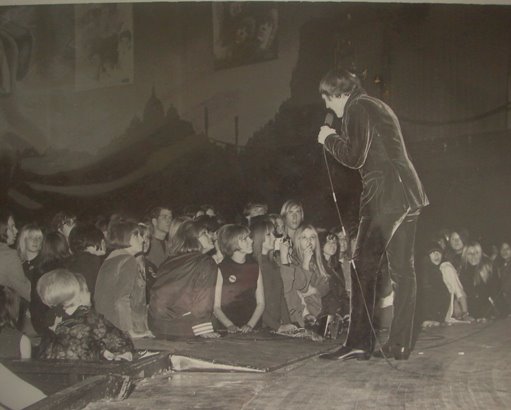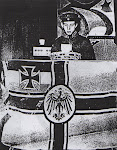Best-known for its version of "Nobody but Me," Youngstown, OH's frat rock quartet the Human Beinz featured rhythm guitarist Ting Markulin, lead guitarist Richard Belley, bassist Mel Pachuta, and drummer Mike Tatman. Originally known as the Human Beings, the group was a local favorite and was discovered playing at a Youngstown bar. Their early releases include covers of Bob Dylan's "Times They Are A-Changin'" and Them's "Gloria," as well as renditions of the Who and Yardbirds songs; they released their first singles on the local Gateway imprint. In 1967, the group signed to Capitol Records and scored a Top Ten hit with their cover of the Isley Brothers' "Nobody but Me." On their debut album, which was also named Nobody but Me, the band found their name changed to the Human Beinz, a play on the hippie phrase "be-in." The following year, the group issued Evolutions, which showcased a more original side to the Human Beinz' music, but the album did little and the band ultimately broke up.
MORE
This Ohio, USA-based quartet - Richard Belley (lead guitar), Ting Markulin (rhythm guitar), Mel Pachuta (bass) and Mike Tatman (drums) - made their recording debut on the local Gateway label. Their early releases featured spirited versions of Bob Dylan's "Times They Are A-Changin'" and Them's "Gloria" while other covers revealed an affection for the Who and Yardbirds. Signed to Capitol Records in 1967, the Beinz enjoyed a US Top 10 hit that year with an interpretation of "Nobody But Me", originally recorded by the Isley Brothers. The quartet embraced a more original direction with the competent Evolutions, but disbanded when this brand of superior pop/rock proved unsuccessful.
FROM WIKI
The Beinz started in 1964 as The Premiers, launching their professional career to build a devoted local fan base. In 1966, they changed their name to The Human Beingz because their old name was too 50's & early 60's. They recorded covers of songs by Them, The Yardbirds, The Who and Bob Dylan. The group was also the first to record a cover of "Gloria" by Them, which became a hit for The Shadows of Knight, and covered "The Pied Piper", which later became a hit for Crispian St. Peters. Overall, the Human Beingz enjoyed a reputation as masters of song interpretation.
NOBODY BUT ME (1967)
It's hard to imagine what the kids must have made of the Human Beinz' first album when it was released back in 1968. The band was riding high on the charts with their feedback-enhanced cover of the Isley Brothers' bold statement of dance prowess, "Nobody But Me", and folks who bought their subsequent LP must have been expecting thirty minutes of similar high-swagger garage rock. However, the band and their producer, Lex De Azevdo, had more ambitious stuff in mind, and the closest things on Nobody But Me to the hit single were a clunky cover of Jimi Hendrix's "Foxy Lady" and a guitar-heavy tribute to a voodoo priest, "The Shaman", neither of which are likely to fill any dance floors. Instead, there's the tongue-in-cheek, pseudo-Left Banke pop of "It's Fun To Be Clean", a droning, string-laden interpretation of "Black Is The Color Of My True Love's Hair", a rootsy take on "Turn On Your Love Light" which suggests the Grateful Dead's version without the jamming, and a couple exercises in moody introspection written by the band, "Sueno" and "Flower Grave". Nobody But Me is more than a bit pretentious, but it's also better than you might expect, and it builds on its psychedelic ambitions with greater success than the majority of Nehru-clad Midwesterners of the era. Still, one can't help but wish someone had persuaded the Human Beinz to cut a few more R&B covers while they were in the studio, since that's clearly where their greatest strength lay.

EVOLUTIONS (1968)
In 1967, the Human Beinz scored a hit single with their feeback-laced cover of The Isley Brothers' "Nobody But Me", and for a brief and fleeting moment the boys from Youngstown, Ohio were bone fide rock stars. While their first album wasn't anything out of the ordinary, when they went into the studio to record their second LP, they were determined to create something unusual, and you can't argue that they succeeded with Evolutions. An amusing pastiche of neo-psychedelic excess, Evolutions is a far cry from the slightly trippy frat rock of their hit; "The Face" is a tale of lost love drenched with horns and strings, "Close Your Eyes" is a delicate mostly-acoustic plea for hippie-era togetherness, "My Animal" is an oblique pseudo-protest number leavened with sound effects, and "I've Got To Keep On Pushing" is a showcase for Richard Belley's snarling guitar leads. But the real descent into the maelstrom comes with the album's last two tracks; the country rock workout "Two Of A Kind" concludes with the sound of someone tearing apart a piano for several minutes, and the seven-minute "April 15th" gives Belley room for all the guitar freak-out-age he ever dreamed of, which may be a bit more than most fans actually wanted to hear. The Human Beinz are a better and more imaginative band than one might expect on Evolutions; Mel Pachuta, Ting Markulin and Mike Tatman are a solid rhythm section, the songs (mostly written by Lex De Azevedo, who also produced and arranged the album) are pretty good, and even when the album's pretensions seem silly, they don't quite sink into embarrassment. But a cloud of Nehru folly hangs over this album, and while the Human Beinz pull it off (just barely), Evolutions is still the work of a band struggling desperately to chew what they've bitten off.

LIVE IN JAPAN (1968)
A frenetic concert performance from the US psych punks, originally only released in Japan (and now incredibly rare). This contains songs from their first album as well as some storming cover versions including "Mister Soul" and "Foxy Lady"... Bonus tracks include non LP 45 cuts too!
So, I think here you have a little bit of Beinz to enjoy ah? Pay attention to this 3 albums, if you have them take a listen again and if you don`t, what are you waiting for ? A great mix of psychedelic music with garage (sometimes more Psych than raw garage!) Exceptions behind, these albums are classics, highly recommended ! ! ! The three are great. I insist ! Leave your comment of what do you think of these guys !
 BAND INFO
BAND INFO The Gestures never released an album during their brief existence. This 16-track disc was patched together by combining all four songs from their two singles with 12 previously unreleased cuts that were recorded for a projected (but unreleased album). "Run, Run, Run" is a stone classic, from its opening rush of ascending chords to its final chorus. Gestures songwriter Dale Menten penned a couple of other neat, more subdued tunes that bridged surf-frat rock with British Invasion styles. Most of the unreleased stuff, though, is competent, but not overly stunning, covers of mid-'60s hits from both the U.K. and the U.S. As such, it's more a testament to what might have been than a notable document, although garageheads will find it entertaining.
The Gestures never released an album during their brief existence. This 16-track disc was patched together by combining all four songs from their two singles with 12 previously unreleased cuts that were recorded for a projected (but unreleased album). "Run, Run, Run" is a stone classic, from its opening rush of ascending chords to its final chorus. Gestures songwriter Dale Menten penned a couple of other neat, more subdued tunes that bridged surf-frat rock with British Invasion styles. Most of the unreleased stuff, though, is competent, but not overly stunning, covers of mid-'60s hits from both the U.K. and the U.S. As such, it's more a testament to what might have been than a notable document, although garageheads will find it entertaining. 


































